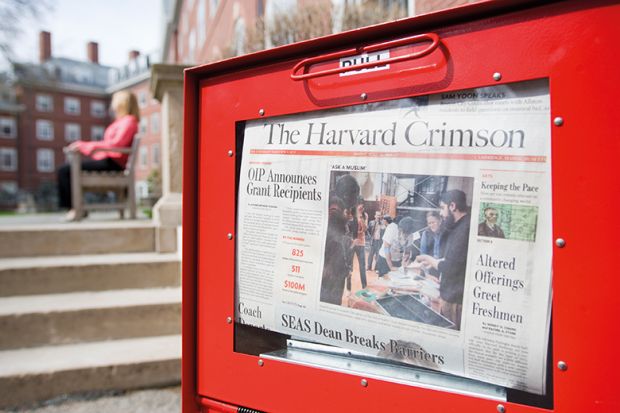High-profile protests against student newspapers at two prominent US universities are making clear to educators a growing generational preference for prioritising political goals over objective truth and balance.
Less clear, however, following the protests at Harvard and Northwestern universities, is what, if anything, universities and their faculty could – or even should – do about it.
Both cases involve students participating in public protests, seeking attention for a cause, then growing angry with student journalists for endeavouring to fully describe that participation.
The discontent reflects a generation increasingly sceptical of unfettered free-speech rights and increasingly conditioned to believe that news media are – and should be – always politically slanted, several experts said.
“The idea is not that news journalism is supposed to be free, fair and independent – it should be on my side,” said Kathleen Culver, director of the Center for Journalism Ethics at the University of Wisconsin at Madison. “And I think that’s highly problematic within a democracy.”
The growth of that viewpoint has been widely studied in recent years as a phenomenon among lesser-educated voters. The campus protests highlight its strength within even highly educated communities such as those of Harvard and Northwestern.
In the case of Harvard, the student council and hundreds of community members criticised the student newspaper, The Harvard Crimson, for taking the routine step of asking a government agency for a comment on protests against it. The campus newspaper for Northwestern University, The Daily Northwestern, apologised for publishing photos of a protest against Jeff Sessions, the former Trump administration attorney general, and for how they contacted some participants for comments. The apology came under heavy criticism from professional journalists.
Reasons for the generational shift, the experts said, appear tied to their experiences of seeing humanity’s historical tribal-based antagonisms multiplied by the powers of technology. Born around the time of the 11 September attacks, they said, such students now faced the robust and growing ability of people to track and attack opponents on an individual basis.
“You’re dealing with a population that’s viewed exposure in a much less benign way than, say, a generation ago,” said Edward Wasserman, professor of journalism at the University of California, Berkeley.
“I don’t think it’s purely a generational thing,” added Matthew Baum, professor of global communications and public policy at Harvard, referring to support for politically motivated limits on free speech, “but I think there is a generational development to it.”
Surveys funded by the Knight Foundation help reinforce such observations, especially among women and minorities. Its latest canvas of US university students, involving more than 4,400 undergraduates, found that men overwhelmingly believed that protecting free speech was more important than fostering an inclusive society, but that female and minority students felt the opposite.
One of the 1,000-plus signatories of a petition castigating the Crimson, Aaron Van Neste, a doctoral candidate in the history of science at Harvard, wrote that the Crimson should “consider the ethics of their alleged neutrality in the face of atrocities committed by [Immigrations and Customs Enforcement]”. Another, Patricia Manos, a doctoral student in art, wrote that the act of calling ICE “alerts them to the presence of undocumented students and workers on campus”.
Mr Van Neste declined to comment for this article and several other signatories did not respond to queries. Ms Manos said she signed the petition out of respect for her students, some of whom “from marginalised communities say that they do not feel physically safe at Harvard”.
Crimson editors said that they respected such concerns and only contacted ICE after the protest had concluded, and without providing details on participants. The editors said that they met with critics of the coverage but could not accept the bias that would result if the Crimson promised in the future to stop contacting people with various perspectives on a particular story.
Universities and their faculty could help reduce such preferences for political goals over the pursuit of objective truths, Professor Culver said. She tries to tackle that with course elements in her media law class that include asking students to argue the opposite side of their political preference on issues such as abortion rights. Similar efforts could be made in a number of other college courses, Professor Culver said.
Professor Baum was doubtful, saying that students tended to arrive on campus with a “pretty well formed” set of values. “I cannot imagine a course that a university could teach that would alter this perspective fundamentally,” he said.
Professor Wasserman saw value in trying, although with measured expectations. The media in general do need to address their history of writing about people without properly considering the effects on their lives, he said. And people outside the media, he said, needed to understand that avoiding needless harm is not the same as avoiding all harm.
Universities and their faculty might be able to help on both counts, Professor Wasserman said. But it was not clear, he added, that students regard even their universities as bringing an unbiased voice to such matters.
“The authority of people in higher ed to pronounce or even to preside over that conversation,” Professor Wasserman said, “is very much in doubt right now.”
POSTSCRIPT:
Print headline: Students question free press in campus media protests
Register to continue
Why register?
- Registration is free and only takes a moment
- Once registered, you can read 3 articles a month
- Sign up for our newsletter
Subscribe
Or subscribe for unlimited access to:
- Unlimited access to news, views, insights & reviews
- Digital editions
- Digital access to THE’s university and college rankings analysis
Already registered or a current subscriber? Login










